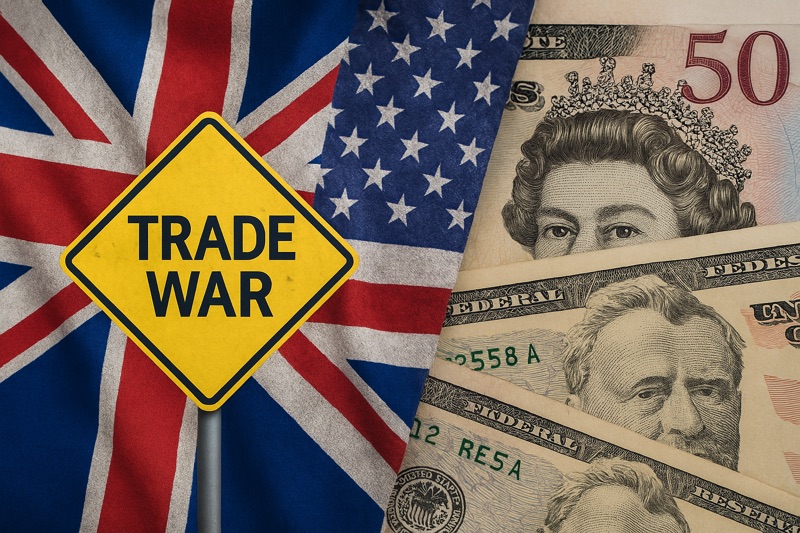
The United Kingdom stands on the precipice of significant economic turmoil as new US tariffs loom on the horizon. With Downing Street signaling that an exemption for British goods is unlikely to be secured in time, the UK braces itself for economic repercussions. This development is a testament to the challenges facing international trade and diplomacy, and raises concerns about the current administration’s strategies in navigating these complexities.
As we stand on the brink of a new economic epoch, the UK finds itself at a pivotal junction. The imminent imposition of US tariffs on 2nd April—including a significant 25% levy on cars and car parts—threatens to reshape the landscape of international trade relations. These tariffs are not limited to the automotive sector but could potentially encompass a broad array of British goods, signalling a critical moment for UK-US economic interactions.
Economic Realities and Governmental Responses : Despite ongoing discussions aimed at forging a robust economic deal between the UK and the US, Downing Street has indicated that an exemption for British goods from these tariffs is unlikely to be negotiated in time. The dialogue, described as “constructive,” nonetheless leaves the UK preparing for a scenario where these tariffs impact not just the UK but other nations as well.
The Prime Minister’s office has reiterated its commitment to the national interest, preparing for all possible outcomes. This includes potential retaliatory measures, though the government maintains that a trade war is in no one’s interest, emphasising a calm and pragmatic response.
Background and Implications: Historically, tariffs have been used as economic tools to protect domestic industries from foreign competition. However, they can also lead to increased costs for consumers and strained international relations. The Office for Budget Responsibility (OBR) has warned that a trade war could shave significant percentages off UK economic growth, potentially necessitating further tax rises or spending cuts if fiscal rules are to be adhered to.
Broader Economic Consequences of Tariffs: The ramifications of these tariffs extend beyond the automotive sector, potentially influencing a range of economic indicators within the UK. The Conservative party has highlighted the economic shock these tariffs could deliver—not just to British businesses and workers but to the Chancellor’s fiscal strategies, which have not accounted for the impact of these tariffs.
Labour representatives, acknowledging the gravity of the situation, advocate for a robust stance similar to that of Canada and the EU, both of which have imposed reciprocal tariffs. This suggests a strategic alignment in international trade relations, emphasising resilience and proactive engagement.
Statistical Insight: The Society of Motor Manufacturers and Traders (SMMT) notes that UK car exports are worth approximately £7.6 billion per year, with the US being the second-largest market after the EU. The imposition of tariffs could severely disrupt this market, impacting not only trade balances but also employment within the sector.
Looking Ahead: Strategic Economic Engagement: The path forward involves crafting a strategic response that minimises the economic impact while promoting long-term resilience. This strategy could include engaging with international partners, exploring alternative markets, and strengthening domestic industries to reduce dependency on volatile international markets.
Future Focused: Innovating within sectors such as technology and renewable energy could open new avenues for economic growth. Diversifying trade relations and enhancing the competitiveness of British goods on the global stage could also serve as crucial strategies.
A Call for Thoughtful Economic Strategy
While the US tariffs present substantial challenges, they also provide an opportunity for the UK to reassess and fortify its economic strategies. By focusing on innovation, diversification, and strategic international cooperation, the UK can navigate these turbulent economic waters and emerge with a more robust and resilient economic framework.
In navigating the complex terrain shaped by the imposition of US tariffs, it’s imperative for the UK to adopt a forward-looking and adaptive economic strategy. While these tariffs present immediate challenges, they also underscore the need for a comprehensive reassessment of our trade policies and economic resilience.
Moving forward, the UK should intensify its efforts in forging stronger trade alliances not just with traditional partners like the EU and the US, but also with emerging economic powers in Asia and Africa. These relationships can help diversify the UK’s economic dependencies and open up new markets for British goods and services, thereby mitigating risks associated with any single geopolitical entity.
Furthermore, the development of domestic industries, particularly in high-tech and green sectors, should be prioritised. Investing in homegrown technologies and sustainable industries can reduce the long-term economic impacts of external tariffs and bolster the UK’s position in global trade negotiations.
Ultimately, the UK’s response to these challenges should not be reactionary but strategic. By focusing on diversification, innovation, and international cooperation, the UK can turn these economic challenges into opportunities to strengthen its global standing and secure a prosperous future for its citizens. This proactive approach will not only safeguard against current threats but also lay the groundwork for enduring economic success.
This isn’t merely about navigating a crisis—it’s about re-envisioning our approach to international trade and economic policy to ensure sustainable growth and prosperity in a globally interconnected landscape.
Further Reading: For more insights into the ongoing discussions and detailed implications of the new tariffs, visit BBC News.



I admire how articles are concise yet informative, giving readers clarity NewsZenith delivers verified news and updates that reflect a strong commitment to journalistic standards and comprehensive reporting.
ReplyDeleteStaying informed feels effortless thanks to the structured reporting NWTMagazine offers, delivering magazine news and updates across key global topics with clarity, accuracy, and consistency each day.
ReplyDeleteIt’s refreshing to find a platform dedicated to verified reporting, and NewsMarketsDaily ensures that each update on global markets, financial developments, and economic trends is thoroughly checked and presented in a straightforward manner that readers can trust.
ReplyDelete